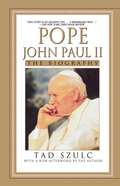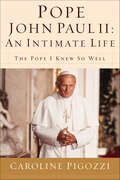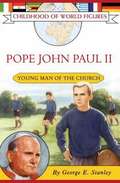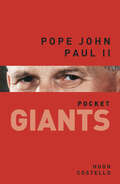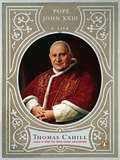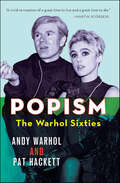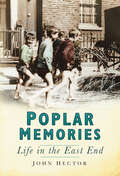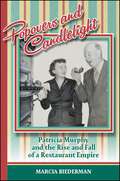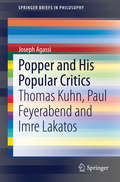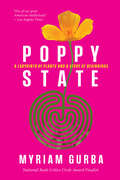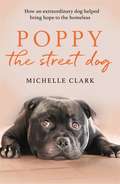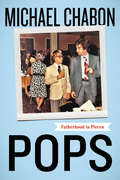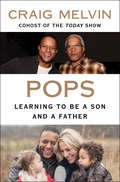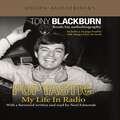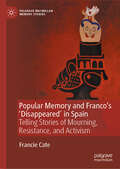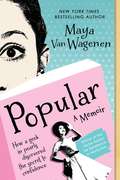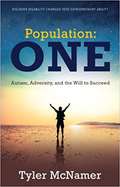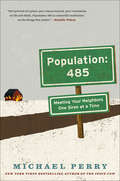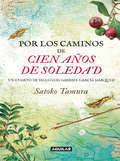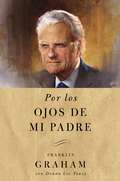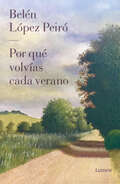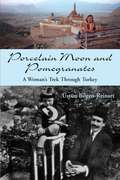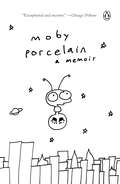- Table View
- List View
Pope John Paul II: The Biography
by Tad SzulcPope John Paul II is one of the pivotal figures of this century, the spiritual head of more than one billion believers and a world statesman of immense stature and influence. Yet, at the age of seventy-six and in the eighteenth year of his papacy, he remains a mystery -- theologically, politically, and personally. Now, through unprecedented access to both the Pope himself and those close to him, veteran New York Times correspondent and award-winning author Tad Szulc delivers the definitive biography of John Paul II. This strikingly intimate portrait highlights the Polishness that shapes the Pope's mysticism and pragmatism, while providing a behind-the-scenes look at the significant events of his public and private life, including:The inside story of the negotiations involving John Paul II, Soviet President Gorbachev, and General Jaruzelski of Poland that led to Poland's and Eastern Europe's transition from communism to democracyJohn Paul II's secret diplomacy, which resulted in the establishment of relations between the Holy See and IsraelThe never-before-told story of how the Polish communist regime helped to "make" Karol Wojtyla an archbishop, the key step on his road to the papacy.Fascinating and thought-provoking, this biography of Pope John Paul II is vital reading not only for Roman Catholics, but for anyone interested in one of the most important figures of our time.
Pope John Paul II: The Pope I Knew So Well
by Caroline PigozziThis behind-the-scenes perspective offers a unique opportunity to experience Pope John Paul II's character and reign, as well as a look at the inner workings of the Vatican. French journalist Caroline Pigozzi discovered a man both awe-inspiring and surprisingly warm and generous. Passionately prayerful and unimpressed by pomp and celebrity, John Paul II was the most-traveled and perhaps the most popular of the popes to date: a people's pope. Pigozzi reveals the intimate details of his daily life, his sometimes surprising philosophies, his revolutionary desire for accessibility to ordinary people, and his relentless drive to unify the church. This book unveils, in a friendly and richly informative way, a close-up of the man whose "eyes radiated infinite goodness" and whose life touched so many.
Pope John Paul II: Young Man of the Church
by George E. StanleyPope John Paul II was born Karol Wojtyla on May 18, 1920, in Poland. As a child Karol excelled in school -- especially in religion and literature. He was a star soccer player and also hiked and kayaked. But most of all Karol loved poetry and theater. Although Karol was liked and respected by his peers, his childhood was touched by tragedy. His mother passed away when he was only nine years old, and three years later his beloved older brother, Edmund, died from scarlet fever. Karol grew up in a time of great uncertainty for Poland. Although he was born into an independent Poland, he was a young man during the Nazi occupation of his homeland in World War II. When many Poles were anti-Semitic, Karol had Jewish friends; when his country turned its back on religion, Karol studied in secret to become a priest. This fascinating biography details Karol's childhood and the events that led him to be named Pope John Paul II in 1978.
Pope John Paul II: pocket GIANTS
by Hugh CostelloThe world was stunned when little-known Karol Wojtyla became the first non-Italian pope for 450 years. As Pope John Paul II, he continued to surprise, directly confronting Communist regimes, flying hundreds of thousands of miles to meet the faithful, and building bridges with other faiths. John Paul II became a bête noire in the eyes of liberals for his staunch refusal to accept contraception or the ordination of women. But for others he was a Churchillian figure who took on the forces of godlessness and moral relativism. He gained a stature that left secular statesmen in his shadow. Love him or loathe him, few could deny that he was a man of rare courage. He survived two assassination attempts, fought off cancer and waged a very public battle with Parkinson’s disease. Seven years after his death he continues to exert a hold over the Church and to inspire an almost cult-like devotion.
Pope John XXIII
by Thomas CahillAngelo Guiseppe Roncalli was an unexpected choice to follow the ultra conservative Pope Pius XII in 1958. At seventy-six years old, 'a fat old man with twinkling eyes and a seductively resonant voice', neither a well-known public figure nor a highly trained theologian, he was at first regarded as a transitional pope. During his brief but unforgettable reign as Pope John XXIII, however, he astonished the world with the seminal and unprecedented change he brought about in the Catholic Church. He was a deeply political man and played an important part on the world stage, helping to defuse the Cuban missile crisis of 1963. He also rewrote litury to avoid any crude condemnation of the Jews, tens of thousands of whom he had saved from the Holocaust when he was an apostolic administrator in Turkey.
Popism: The Warhol Sixties
by Andy Warhol Pat HackettAnecdotal, funny, frank, POPism is Warhol's personal view of the Pop phenomenon in New York in the 1960s.A cultural storm swept through the 1960s—Pop Art, Bob Dylan, psychedelia, underground movies—and at its center sat a bemused young artist with silver hair: Andy Warhol. Andy knew everybody (from the cultural commissioner of New York to drug-driven drag queens) and everybody knew Andy. His studio, the Factory, was the place: where he created the large canvases of soup cans and Pop icons that defined Pop Art, where one could listen to the Velvet Underground and rub elbows with Edie Sedgwick and where Warhol himself could observe the comings and goings of the avant-garde.In the detached, back-fence gossip style he was famous for, Warhol tells all in POPism—the ultimate inside story of a decade of cultural revolution.
Poplar Memories: Life in the East End
by John HectorPoplar Memories is a vivid impression of Cockney London before and during the Second World War, set in a teeming, rundown docklands neighbourhood famous for being, well, one end of the Blackwall Tunnel.John Hector’s spellbinding account of his early life in the 1920s and ’30s conjures up a vanished era when simplicity and happiness went hand-in-hand. Halcyon days of ‘talking pictures’ and pavement buskers, Saturday night knees-ups round the piano, eel and pie stalls, chimneysweeps, ‘boxers’, Clarnico’s toffees and Lloyd Loom furniture, and a little shop called Woolworth’s selling ‘nothing over sixpence’ – unless it’s a shilling. All this was to disappear forever in the horrors of the Blitz. The author was disabled by infantile paralysis – yet he became School Captain and embarked on a successful career at 14, surviving extreme poverty, panel doctors, dockers’ riots and Hitler’s Luftwaffe with an unshakeable belief in the ordinary people of Poplar.
Popovers and Candlelight: Patricia Murphy and the Rise and Fall of a Restaurant Empire (Excelsior Editions)
by Marcia BiedermanWhat would you do with your last sixty dollars? If you were Patricia Murphy you'd turn it into a fortune by buying a rundown Brooklyn diner. On the cusp of the Great Depression, the diner became an overnight sensation, the first of nine popular Patricia Murphy's Candlelight Restaurants that opened over the course of four decades in New York and Florida. Popovers and Candlelight recounts how Murphy bucked Mad Men–era sexism in a male-dominated field and created remarkable dining experiences with solid American fare, a talented staff, and eye-popping décor. Dripping in diamonds, she transcended ethnic prejudices to become a socialite and built a brand that sold fragrance as well as food. Mutinous siblings, a desperate manager, and a typhoid outbreak brought it all to an operatic end, but Marcia Biederman restores Murphy and her contributions to their proper place in women's and culinary history. This book will delight readers with its rags-to-riches story and fascinating view of class, gender, ethnicity, and food culture during much of the twentieth century.
Popper and His Popular Critics
by Joseph AgassiThis volume examines Popper's philosophy by analyzing the criticism of his most popular critics: Thomas Kuhn, Paul Feyerabend and Imre Lakatos. They all followed his rejection of the traditional view of science as inductive. Starting from the assumption that Hume's criticism of induction is valid, the book explores the central criticism and objections that these three critics have raised Their objections have met with great success, are significant and deserve paraphrase. One also may consider them reasonable protests against Popper's high standards rather than fundamental criticisms of his philosophy The book starts out with a preliminary discussion of some central background material and essentials of Popper's philosophy. It ends with nutshell representations of the philosophies of Popper. Kuhn, Feyerabend and Lakatos. The middle section of the book presents the connection between these philosophers and explains what their central ideas consists of, what the critical arguments are, how they presented them, and how valid they are. In the process, the author claims that Popper's popular critics used against him arguments that he had invented (and answered) without saying so. They differ from him mainly in that they demanded of all criticism that it should be constructive: do not stop believing a refuted theory unless there is a better alternative to it. Popper hardly ever discussed belief, delegating its study to psychology proper; he usually discussed only objective knowledge, knowledge that is public and thus open to public scrutiny.
Poppy State: A Labyrinth of Plants and a Story of Beginnings
by Myriam GurbaFrom the award-winning author of Creep comes a powerful book by a writer at the peak of her powers—at once a love letter to California and a literary tour de force that tells the story of resilience and reclamation through a relationship with plants, memory, myth, and indigenous knowledge. Myriam Gurba has lived in California her entire life, with its plants and soils, forests and ecology, immersing herself in the language of the landscape as refracted through the languages and memories of her ancestors. In Poppy State, California plants serve as structural anchors in a wildly inventive work of narrative nonfiction that is part botanical criticism, part personal storytelling, and part study of place. The reader is invited to commune with California with Gurba as their guide, ushered through a compendium of anecdotes, reminiscences, utterances, lists, incantations, newspaper articles, and other ephemera. Through the stories of these plants she comes to a new understanding of what occurs in the cultivation of a soul. Gurba learns if she can care for her body as she does her plants, her soul can thrive—like the California poppy on her kitchen windowsill. And through walks in the Angeles National Forest, she visits oaks, crows, elderberries, and sycamores, while foraging for acorns, flowers, and berries to adorn her altar at home. Poppy State is a riveting tour de force.&“The mother of intersectional Latinx identity.&” —Cosmopolitan "Scorchingly good."—Cheryl Strayed &“The most fearless writer in America.&” —Luis Alberto Urrea, Pulitzer Prize finalist "A truly distinctive, authentic, and dynamic literary voice. . . Myriam Gurba is one of our great American intellectuals." —Los Angeles Times
Poppy The Street Dog: How an extraordinary dog helped bring hope to the homeless
by Michelle ClarkA heartwarming true animal story, for fans of A Dog's Purpose, A Street Cat Named Bob and Marley & Me.Michelle Clark has loved animals all her life, filling her home with a menagerie of stray cats and abandoned dogs. But when her outreach work with London's homeless community leads to a chance meeting with a desperate man, and a quest to find a missing Staffie named Poppy, she has no idea that her life will be transformed forever.Poppy is unlike any other dog that Michelle has ever met, with her unwavering loyalty, gentle nature and wise, kind eyes. Soon, Poppy finds her way not just into Michelle's heart, but into her home too.Inspired Poppy's extraordinary love and devotion, Michelle finds herself at the start of a journey to bring hope and help to the hundreds of other precious dogs who call the city streets their home.An inspiring, heartwarming true story about the incredible bond that exists between humans and animals, and how, in rescuing them, we can also rescue ourselves.
Pops: Fatherhood in Pieces
by Michael Chabon“Magical prose stylist” Michael Chabon (Michiko Kakutani, New York Times) delivers a collection of essays—heartfelt, humorous, insightful, wise—on the meaning of fatherhood.For the September 2016 issue of GQ, Michael Chabon wrote a piece about accompanying his son Abraham Chabon, then thirteen, to Paris Men’s Fashion Week. Possessed with a precocious sense of style, Abe was in his element chatting with designers he idolized and turning a critical eye to the freshest runway looks of the season; Chabon Sr., whose interest in clothing stops at “thrift-shopping for vintage western shirts or Hermès neckties,” sat idly by, staving off yawns and fighting the impulse that the whole thing was a massive waste of time. Despite his own indifference, however, what gradually emerged as Chabon ferried his son to and from fashion shows was a deep respect for his son’s passion. The piece quickly became a viral sensation.With the GQ story as its centerpiece, and featuring six additional essays plus an introduction, Pops illuminates the meaning, magic, and mysteries of fatherhood as only Michael Chabon can.
Pops: Learning to Be a Son and a Father
by Craig MelvinA “deeply personal, heartwarming” exploration of fatherhood, addiction, and resiliency from the award–winning news anchor of NBC’s Today show (Shondaland).Growing up in Columbia, South Carolina, Craig Melvin had a fraught relationship with his father. A hard-drinking man who worked the graveyard shift at a postal facility, Lawrence Melvin was a distant parent. Craig found ways of connecting with his father through sports and tinkering with his beloved 1973 Pontiac LeMans. But as Lawrence’s drinking spiraled out of control, their bond was stretched to the breaking point. Fortunately, Craig had a loving, fiercely protective mother who held the family together. He also had a series of surrogate father figures in his life—uncles, teachers, workplace mentors—who by their examples helped him figure out the kind of person and father he wanted to be. Pops is the story of all these men, and of the inspiring fathers Craig has met reporting his “Dads Got This Series” on the Today show. For Craig, this book is an opportunity to better understand his father; to interrogate his family’s legacy of addiction and despair as well as transformation and redemption; and to explore the challenges facing all dads—including Craig himself, a father of two young children.
Poptastic!: My Life in Radio
by Tony BlackburnTony Blackburn is probably one of the most recognisable disc jockeys working in Britain today, and is always busy doing what he does best - playing music to listeners. With Radio One celebrating its 40th anniversary this year, Tony feels the time is right to commemorate his own anniversary, and look back on the time he has spent in radio and the media. The days spent as a radio pirate, to becoming the number one DJ in the UK for the best part of a decade. The stars he befriended, the rivalries in radio he endured, the friendships made, and broken, all will be told in his candid style. Much as John Peel's book was a reflection of one style of DJing, so will this book be for Tony's unique brand of playing and enjoying music. Much derided by some comedians, but very much still going strong, and ever popular.(p) 2007 Orion Publishing Group
Popular Images of American Presidents
by William C. SpragensHow our Presidents are rated by various groups.
Popular Memory and Franco's 'Disappeared' in Spain: Telling Stories of Mourning, Resistance, and Activism (Palgrave Macmillan Memory Studies)
by Francie Cate“Francie Cate’s Popular Memory and Franco’s ‘Disappeared’ is an obra magistral, an opus magnum, a masterwork. It is an in-depth and broad study in which further research on memory, imposed forgetting, counter-memory, and the dynamics of cultural memory will be rooted.” – Maureen Tobin Stanley, University of Minnesota Duluth, USA This book examines a "people's history" of the Spanish Civil War's anti-fascists who lost their 1936-1939 fight against far right military insurgents. The book argues that the regime’s “disappeared” have in fact since 1936 been the most visible protagonists safeguarded in the shared collective memory of the war’s losers. Narratives about Franco’s up to 150,000 civilian shooting victims—stories told in the form of memoirs, political speeches, visual art, film, novels, and oral testimonies—form the centerpiece of this study. How have these narratives told by the war’s losers--focused explicitly on the figure of the dead body—been mobilized in periods of political upheaval from 1936 to the present, including WWII; the 1950s and 60s of the Cold War; the 1970s and 80s Spanish Transition; ongoing mass media “culture wars” that have polarized the Right and the Left since public exhumations of unmarked graves began in the year 2000? Through fieldwork in the province of Cádiz, the authorhas also recorded interviews with family members of citizens who were murdered. Through oral narratives, an entire community—violently punished during the years of the dictatorship—succeeded in keeping alive an alternative history of the pre-war enterprise to establish the 1931 Spanish democratic Republic and to build a modern nation bound by constitutional law. The discursive commonalities identified in the wide-ranging testimonies—including pioneering researchers’ publications beginning in the 1970s—constitute a fascinating textual topography of popular cultural memory. This book argues that this treasure trove of storytelling preserved an initially clandestine counter narrative of anti-Francoist resistance, as well as dreams of justice for the dead.
Popular: Vintage Wisdom for a Modern Geek
by Maya Van WagenenA breakout teen author explores the true meaning of popularity in a hysterically funny, touchingly honest contemporary memoir. Can curlers, girdles, Vaseline, and a strand of pearls help a shy girl become popular? Maya Van Wagenen is about to find out. Stuck near the bottom of the social ladder at "pretty much the lowest level of people at school who aren't paid to be here," Maya has never been popular. But before starting eighth grade, she decides to begin a unique social experiment: spend the school year following a 1950s popularity guide, written by former teen model Betty Cornell. The real-life results are hilarious, painful, and filled with unexpected surprises. Told with humor and grace, Maya's journey offers readers of all ages a thoroughly contemporary example of kindness and self-confidence, along with a better understanding of what it means to be popular.
Population One: Autism, Adversity, and the Will to Succeed
by Tyler McNamerBeing different from the masses is one of the greatest gifts that you possess! Let s face it: Who wants to be just like everyone else? Talk about boring! People come in all shapes and sizes and are born with natural and unnatural gifts and talents like no other, and your greatest challenge is to discover your gifts and then apply them to the world to create a better place, a better planet, a better universe! That is my challenge to you so that all of us can get along peacefully and become truly a population of one. I would like to ask you some questions to help you discover what makes you unique, different, and awesome. Are you different? Are you unique? Do you look different than others? Talk differently than others? Do you walk differently than others? Have you been born with talents that very few others have? Have you been brainwashed to look at your talents as a disability? Do you stay up nights dwelling on all the things in life you don t have, rather than focus on all the blessings you do have? Have you ever been bullied at school, at home, and in many areas in your life? Have you ever been called a retard, dumb, disabled ? If you have answered yes to any of these questions, perhaps you have yet to understand, accept, and apply your unique gifts to make the world a better place. If you have answered Yes to any of these questions, I feel your pain, I have walked in your shoes, and I can empathize with your situation. I have been bullied, called a retard, told that I am disabled, put in special classes, advised that I should not expect to reach my goals. My name is Tyler McNamer and I have been called ALL of the above many, many times in my life.
Population: 485
by Michael PerryHere the local vigilante is a farmer's wife armed with a pistol and a Bible, the most senior member of the volunteer fire department is a cross-eyed butcher with one kidney and two ex-wives (both of whom work at the only gas station in town), and the back roads are haunted by the ghosts of children and farmers. Michael Perry loves this place. He grew up here, and now -- after a decade away -- he has returned. Unable to polka or repair his own pickup, his farm-boy hands gone soft after years of writing, Mike figures the best way to regain his credibility is to join the volunteer fire department. Against a backdrop of fires and tangled wrecks, bar fights and smelt feeds, he tells a frequently comic tale leavened with moments of heartbreaking delicacy and searing tragedy.
Por los caminos de cien años de soledad
by Satoko KawamuraPor los caminos de Cien años de soledad es un recorrido emocionante porlos sitios que sirvieron como base creativa para la novela más celebradade Gabriel García Márquez. Aderezado con anécdotas deliciosas de la vidadel nobel colombiano, con entrevistas a sus parientes y a sus amigoscercanos, con pasajes memorables de su infancia y de su adolescencia,este libro entreteje literatura y realidad para entregarnos un homenajea la vez ágil, sagaz y conmovedor.
Por los ojos de mi padre
by Franklin GrahamBilly Graham, el amado evangelista y respetado hombre de Dios, nunca dudó de su propósito en la vida: ayudar a las personas a tener una relación personal con Dios a través del conocimiento salvador de Jesucristo. Ese fue un llamado que creció cada vez más en intensidad y Billy lo aceptó por completo durante su ministerio activo y más allá de este. No obstante, al igual que muchos otros hombres, él se dedicó también al llamado igualmente valioso de ser un esposo y padre amoroso. Aunque la mayoría de la gente conocía a Billy Graham como una leyenda viviente, Frankin Graham lo conoció como su papá. Y aunque las generaciones actuales y futuras llegarán a sus propias conclusiones acerca de Billy Graham y el legado de su entrega a Cristo, nadie puede abordar el tema con más detalles y con toda la seriedad del caso que un hijo que se crio a la sombra de la vida de su padre y del ejemplo de su amor. «Mi padre dejó un testimonio de Dios», explica Franklin, «y una herencia que no quedará enterrada en una tumba, sino que seguirá guiando a la gente a su destino celestial. El Señor le dirá a él y a todos los que le sirven con obediencia: “Bien, buen siervo y fiel” (Mateo 25.21)». Este libro relata la notable vida de Billy no como la historia de un gigante espiritual, sino de la forma en que Franklin siempre lo ha visto: a través de los ojos de su padre. X
Por qué volvías cada verano
by Belén López PeiróEl libro que terminó con el secreto alrededor del abuso y se convirtió en clave de cientos de denuncias. «Hay libros que son hechos. Este es uno: se puede leer como una novela, como una denuncia, como la propia construcción. Porque es todo eso: una novela polifónica, el relato de un abuso padecido en la adolescencia en manos de un hombre armado, un tío poderoso, el macho de la familia y del pueblo. Y un hecho: acá está la mujer que fue la nena que ese tipo quiso romper para su uso personal. Y está toda entera, fuerte, hablando de lo que da tanta vergüenza hablar. Escribiendo contra todos los que intentaron callarla. Contra sí misma, incluso, a veces. Este libro es una batalla: la que ganó Belén López Peiró iniciando un juicio, buscando asesoramiento legal en un sistema que no les prodiga justicia a las víctimas, contándoles a todos sus parientes y vecinos, obligándolos a ver lo que no querían ver. Y escribiendo, haciendo de su propia experiencia una obra exquisita, una intervención política poderosa. Y muy necesaria».Gabriela Cabezón Cámara La crítica dijo: «El mapa de aquello que nos sucede, por fin al completo. Imprescindible».Brigitte Vasallo «Para mí un libro definitivo sobre el abuso sexual, además del descubrimiento de una voz de la que quiero leer mucho más».Nuria Labari «No, no es un libro para disfrutar. Es un libro para entender, para empatizar, para hacer real lo que no muchas se atreven a decir en alto».Andra.eus «Por eso la forma de este libro es tan perfecta o precisa para abordar la violencia machista, porque consigue hacer emocionalmente muy palpable la complejidad del entramado que sostiene la impunidad, el ruido de los juicios de los otros en la cabeza de una víctima, cuando no hay jerarquías, ni valoraciones, ni justicia. Solo la nítida ajenidad de todos ante la experiencia propia de la vulnerabilidad».Gabriela Wiener, elDiario.es «Belén López Peiró relata el abuso sexual sin ambigüedades, pero con mucha literatura». Mauro Libertella
Porcelain Moon and Pomegranates: A Woman's Trek Through Turkey
by Üstün Bilgen-ReinartFor millennia, the land now called Turkey has been at the crossroads of history. A bridge between Europe and Asia, between West and East, between Christianity and Islam, the peninsula also known as Anatolia, the place where the sun rises, is one of the oldest continually inhabited regions on the planet. In this unique blend of memoir and travel literature, Üstün Bilgen-Reinart explores the people, politics, and passions of her native country, whisking the reader on a journey through time, memory, and space. She searches deep into the roots of her own ancestry and uncovers a family secret, breaks taboos in a nation that still takes tradition very seriously, and navigates through dangerous territory that sees her investigating brothels in Ankara, probing honour murders in Sanliurfa, encountering Kurds in the remote southeast, and witnessing the rape of the earth by a gold mining company in Bergama.
Porcelain: A Memoir
by MobyFrom one of the most interesting and iconic musicians of our time, a piercingly tender, funny, and harrowing account of the path from suburban poverty and alienation to a life of beauty, squalor, and unlikely success out of the NYC club scene of the late '80s and '90s.There were many reasons Moby was never going to make it as a DJ and musician in the New York club scene. This was the New York of Palladium; of Mars, Limelight, and Twilo; of unchecked, drug-fueled hedonism in pumping clubs where dance music was still largely underground, popular chiefly among working-class African Americans and Latinos. And then there was Moby--not just a poor, skinny white kid from Connecticut, but a devout Christian, a vegan, and a teetotaler. He would learn what it was to be spat on, to live on almost nothing. But it was perhaps the last good time for an artist to live on nothing in New York City: the age of AIDS and crack but also of a defiantly festive cultural underworld. Not without drama, he found his way. But success was not uncomplicated; it led to wretched, if in hindsight sometimes hilarious, excess and proved all too fleeting. And so by the end of the decade, Moby contemplated an end in his career and elsewhere in his life, and put that emotion into what he assumed would be his swan song, his good-bye to all that, the album that would in fact be the beginning of an astonishing new phase: the multimillion-selling Play. At once bighearted and remorseless in its excavation of a lost world, Porcelain is both a chronicle of a city and a time and a deeply intimate exploration of finding one's place during the most gloriously anxious period in life, when you're on your own, betting on yourself, but have no idea how the story ends, and so you live with the honest dread that you're one false step from being thrown out on your face. Moby's voice resonates with honesty, wit, and, above all, an unshakable passion for his music that steered him through some very rough seas. Porcelain is about making it, losing it, loving it, and hating it. It's about finding your people, your place, thinking you've lost them both, and then, somehow, when you think it's over, from a place of well-earned despair, creating a masterpiece. As a portrait of the young artist, Porcelain is a masterpiece in its own right, fit for the short shelf of musicians' memoirs that capture not just a scene but an age, and something timeless about the human condition. Push play.
Porcelain: A Memoir
by MobyFrom one of the most interesting and iconic musicians of our time, a piercingly tender, funny, and harrowing account of the path from suburban poverty and alienation to a life of beauty, squalor, and unlikely success out of the NYC club scene of the late '80s and '90s.There were many reasons Moby was never going to make it as a DJ and musician in the New York club scene. This was the New York of Palladium; of Mars, Limelight, and Twilo; of unchecked, drug-fueled hedonism in pumping clubs where dance music was still largely underground, popular chiefly among working-class African Americans and Latinos. And then there was Moby--not just a poor, skinny white kid from Connecticut, but a devout Christian, a vegan, and a teetotaler. He would learn what it was to be spat on, to live on almost nothing. But it was perhaps the last good time for an artist to live on nothing in New York City: the age of AIDS and crack but also of a defiantly festive cultural underworld. Not without drama, he found his way. But success was not uncomplicated; it led to wretched, if in hindsight sometimes hilarious, excess and proved all too fleeting. And so by the end of the decade, Moby contemplated an end in his career and elsewhere in his life, and put that emotion into what he assumed would be his swan song, his good-bye to all that, the album that would in fact be the beginning of an astonishing new phase: the multimillion-selling Play. At once bighearted and remorseless in its excavation of a lost world, Porcelain is both a chronicle of a city and a time and a deeply intimate exploration of finding one's place during the most gloriously anxious period in life, when you're on your own, betting on yourself, but have no idea how the story ends, and so you live with the honest dread that you're one false step from being thrown out on your face. Moby's voice resonates with honesty, wit, and, above all, an unshakable passion for his music that steered him through some very rough seas. Porcelain is about making it, losing it, loving it, and hating it. It's about finding your people, your place, thinking you've lost them both, and then, somehow, when you think it's over, from a place of well-earned despair, creating a masterpiece. As a portrait of the young artist, Porcelain is a masterpiece in its own right, fit for the short shelf of musicians' memoirs that capture not just a scene but an age, and something timeless about the human condition. Push play.
